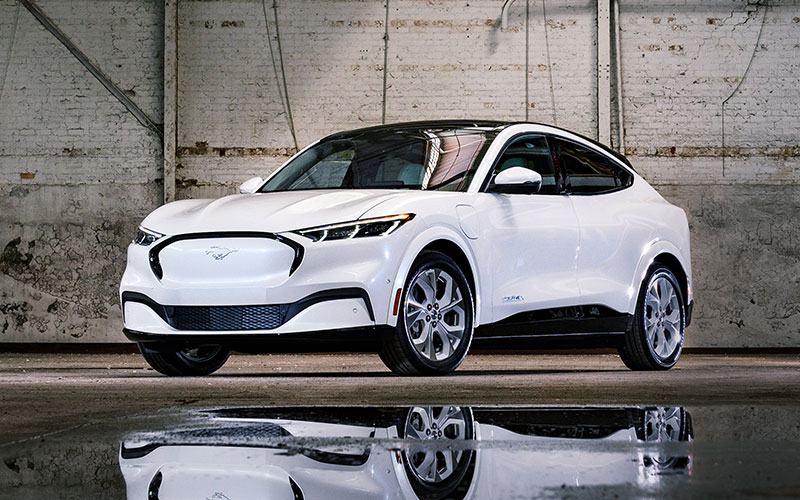Electric Vehicle Issues for Ford and Tesla
Two of the big players in the electric vehicle game are facing some challenges. Find out what’s going on with Ford and Tesla.
Recent Problems with Electric Vehicles

Electric Vehicles (EV) have both been growing in popularity and undergone extensive scrutiny from those who oppose the new vehicle platform. While the future may be full of vehicles powered exclusively by electricity, there’s a long way to go before total public adoption of EVs. Current auto manufactures are doing their best to catch up and get their own EVs out on the road as fast as possible, but it’s a daunting task with all of the hurdles in their way. Circuit boards, copper, and other necessary materials important to the manufacturing of EVs are in short supply following plant closures due to the pandemic and other affairs hampering production around the world.
Material shortages aren’t the only thing hampering production of EVs though, there are also issues with how technologically advanced these vehicles are trying to be within such a short window of development. All of the electrical components, new systems, new sensors, and those giant rechargeable batteries are proving to be hard for manufacturers to get just right and not pose any issues for drivers. Today, two EV producers are facing challenges with their vehicles thanks to issues found within their EV systems. Here’s what we know about Ford and Tesla’s current EV situations.
Ford Issues Stop-Sale on Their Mustang Mach-E

Ford has recently instructed its dealers to temporarily stop sales on the all-electric Ford Mustang Mach-E and plans to issue a recall for around 49,000 models from 2021 and 2022. It has been discovered that the EV crossover potentially has a safety defect that can cause the vehicle’s high voltage battery main contactors to overheat. This overheating can lead to a malfunction that will not allow the Mustang Mach-E to start or cause it to suddenly lose power while in motion. Once this overheating occurs it can leave the EV completely immobile.
Ford said it has identified potentially affected Ford Mustang Mach-E models down to the ones built in their Mexico plant between May 27, 2020 and May 24, 2022. That time frame accounts for nearly half of the 100,000 new Ford Mustang Mach-E models from 2021 and 2022.

This isn’t the first significant recall the Mustang Mach-E has had, it recently had a recall for unintended acceleration, deceleration, or loss of power that we talked about over here. Ford has also been getting hit with a lot of other notable non-EV recalls for many of their other vehicles as of late.
Tesla’s Autopilot Undergoing NHTSA Investigation

Tesla has been under investigation by the National Highway Traffic Safety Administration (NHSTA) for their Autopilot system since August of 2021, but the agency has escalated their investigation as more crashes have occurred due to Autopilot. The investigation started by looking into 11 incidents that involved a Tesla model utilizing the Level 2 autonomous driving system that had crashed into stationary first responder vehicles on roadways. The Tesla models struck one or more of the vehicles parked at the scenes and seemingly disregarded any emergency lights, flares, cones, or other safety equipment while driving at night. These incidents with Tesla models have resulted in 17 injuries and one fatality.
Since the initial investigation, the number of reported crashes has risen to 16 and the NHTSA has become aware of 191 crashes that have occurred while the Tesla Autopilot system was engaged. The administration is continuing to evaluate the circumstances of the incidents, assess the technologies built into Tesla’s vehicles, and look into the different ways that Tesla’s Autopilot monitors and assists the driver in autonomous driving. They’re also assessing the human side of the incidents, such as the engagement technology built into Tesla models that track and detect the driver while Autopilot is engaged and any other considerations that may result from human error.

If NHSTA finds that Tesla’s autopilot feature is a major safety concern, over 800,000 Tesla models with the Autopilot feature will need to be recalled. That recall would account for Tesla’s Model S, Model X, Model Y, and Model 3 electric vehicles that were produced between 2014 and 2022. Tesla models feature over the air updates and Elon Musk recently went on Twitter to boast about his latest full self-driving software advancement that he states “smooths out intersection control, especially long lefts, and starts to handle roads with no map data at all.” He also noted that the company plans to eventually roll out the same-day Tesla North American service to two thirds of Tesla models.
There is currently no timeline established by the NHSTA as to when they will conclude their investigation, but it seems that Elon and his team are already working on fixes to their Autopilot software to alleviate the issues.









